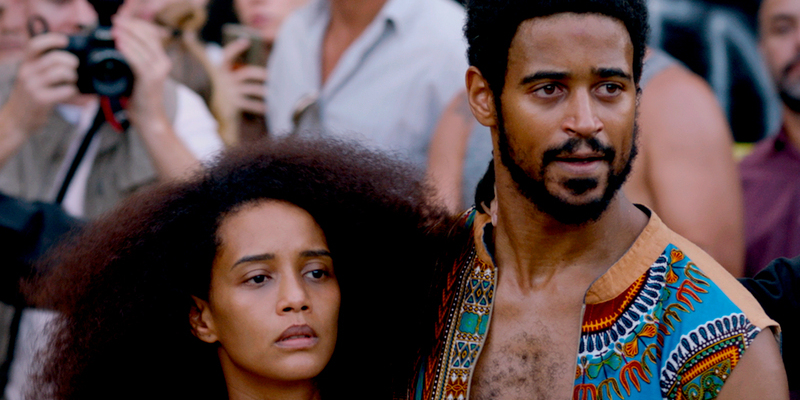
Review by
Eric Hillis
Directed by: Lázaro Ramos
Starring: Alfred Enoch, Taís Araújo, Seu Jorge, Adirana Esteves, Renata
Sorrah

In similar fashion to Kleber Mendonça Filho and Juliano Dornelles'
Bacurau
and Gabriel Mascaro's
Divine Love, actor turned director Lázaro Ramos's feature debut
Executive Order is set in a near future dystopian Brazil
where the fascistic policies of Bolsonaro have been given a steroid
boost. That's unfortunately where the similarities end, as Ramos's film
approaches its hot-button premise in the shallow manner of a Young Adult
adaptation.

In the film's future Brazil, a white supremacist government is
determined to make the country as vanilla as possible. To achieve this,
citizens with a high melanin count are offered a free one-way ticket to
the African nation of their choosing, dressed up in woke language about
Brazil atoning for its colonialist past. Naturally, very few avail of
this offer and so the government decides to take more drastic measures.
Those with a high melanin count are to be rounded up and deported to
Africa.
The film focusses on two characters and their separate storylines in
the midst of this purge. Accompanied by his blogger brother (singer
Seu Jorge), a young lawyer (British actor
Alfred Enoch making his Brazilian debut) holes up in his
apartment, protected by a supportive crowd of activists who stream his
balcony pleas to the world. Meanwhile his doctor girlfriend (Taís Araújo) finds herself taking refuge in an "Afro-bunker", an underground
hideout where the White boyfriend of a gay Black man is put on trial by
a kangaroo court.

Executive Order certainly has an arresting premise, but
Ramos and co-screenwriter Lusa Silvestre haven't thought through
how this scenario would play out in any recognisable version of reality.
For a start, for the government of Brazil to implement this policy, the
nations of Africa would have to go along with such racism, something
which simply wouldn't happen. Regardless of the ethical issues, I doubt
any African nation would welcome the flood of refugees that would
result. Secondly, we're not talking about some predominantly White
country were Black and mixed-race people are a small minority – this is
Brazil, where half the population has African blood; the logistics of
rounding up so many people and sticking them on planes is a complete
non-starter. Thirdly, would Brazilians really be willing to destroy
their football team overnight? Not to mention what the United Nations
might have to say about all this.
Ramos opens his film in goofy fashion, playing on how nonsensical the
idea of offering Black people a one-way ticket "home" is, the sort of
idea you might hear proffered on a right wing talk show or from a grumpy
taxi driver. It has the feel of a teatime "Yoof" TV show, all primary
colours, pretty people, hip soundtrack and drone shots for the hell of
it. Then when the titular executive order is issued, Ramos tries to tell
us it's time to get serious, but this change of tone doesn't fit the
playful aesthetic he's established. The resulting film plays out like a
chapter of one of the many Young Adult sagas that hogged cinema screens
in the last decade, a poorly-conceived dystopian sci-fi in which
beautiful young people fight back against an authoritarian regime.

Given its premise, you might expect Executive Order to
resemble
The Battle of Algiers, all riots in the streets and angry revolution, but it falls back on
two dull scenarios, its two central characters simply hanging out in
their respective sanctuaries. A closing montage narrated by Jorge that
employs real life footage of Brazilian protests has a fire in its belly
that's notably absent from the staid and superficial movie that precedes
it. Rarely has such an incendiary premise been executed in such polite
fashion.

